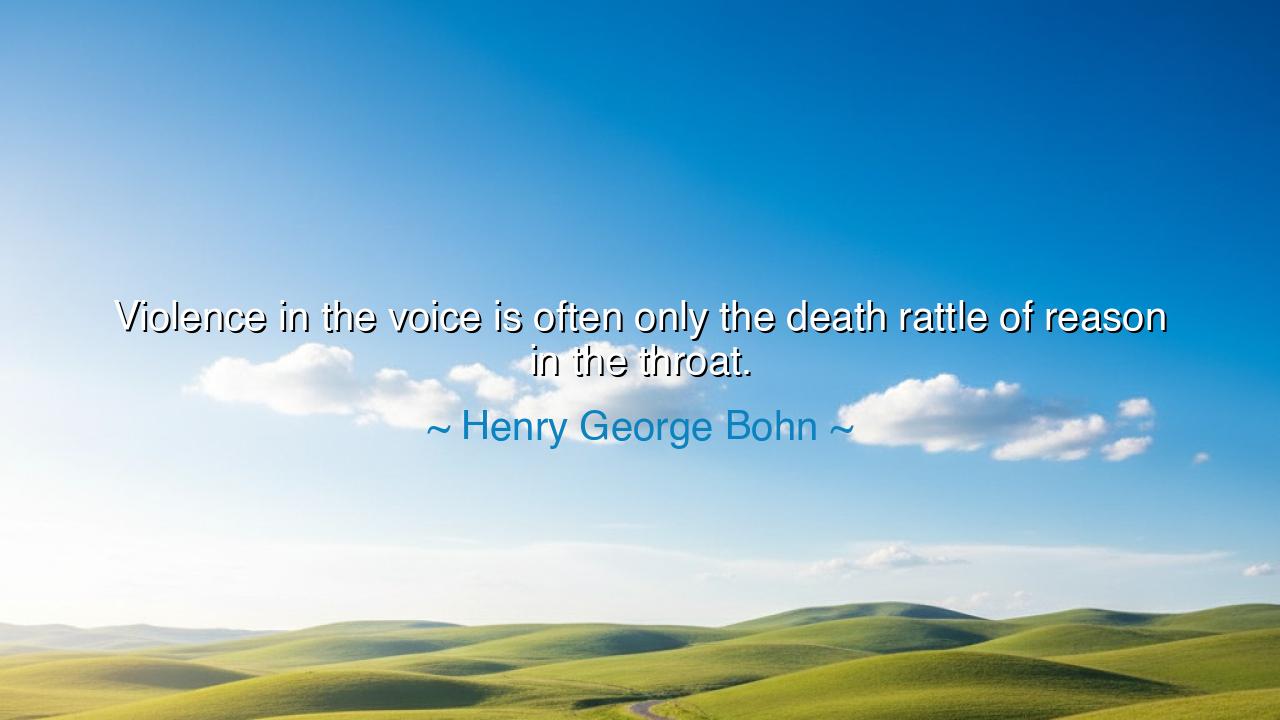
Violence in the voice is often only the death rattle of reason in






The English publisher and scholar Henry George Bohn once said, “Violence in the voice is often only the death rattle of reason in the throat.”
These words, though crafted in quiet reflection, thunder with the power of timeless truth. They speak of the collapse of reason, the moment when wisdom falters and anger seizes the tongue. For when men shout instead of think, when they roar instead of reason, it is not strength that speaks — it is the dying breath of intellect, the sound of the mind surrendering to chaos. Bohn’s words remind us that true power is not found in volume, but in clarity, and that the voice raised in fury often betrays the weakness of its argument.
The origin of this quote emerges from Bohn’s 19th-century England — an age of debate, discourse, and rising democratic ideals. It was a time when the spoken word was a weapon of persuasion, wielded in parliaments, pulpits, and public squares. Bohn, a man of letters and learning, observed that when reason stands firm, it speaks with calm precision. But when truth weakens, its guardians grow loud. The “violence in the voice,” he warns, is not the mark of conviction, but of desperation — the final gasp of reason as it drowns beneath pride and emotion. His insight is as true today as it was then, for though centuries have passed, human hearts remain the same: quick to anger, slow to listen.
The ancients, too, knew this law of the spirit. Socrates, when confronted by those who mocked or threatened him, answered not with rage, but with gentle questioning, until his opponents defeated themselves with their own contradictions. Confucius taught that “the gentleman is calm and peaceful; the small man is full of worry and anger.” Even Jesus of Nazareth, when reviled, did not raise his voice, but answered in silence or parable. Across all ages, the masters of wisdom have known that truth requires no shouting. The violent voice belongs not to the sage, but to the fearful — to those who sense their reason slipping and try to replace it with noise.
History offers many examples of this truth. In the stormy halls of the French Revolution, as reason gave way to vengeance, voices once eloquent turned into screams. The calm arguments of liberty degenerated into the howls of the mob, and soon the guillotine sang where philosophers once spoke. Violence in speech became violence in deed. So too, in countless moments across time, nations, families, and individuals have witnessed how uncontrolled words become the sparks that set the world aflame. The voice, meant to convey understanding, becomes instead the herald of destruction. Thus, Bohn’s warning is not about speech alone, but about the spirit that governs it — for when the heart loses balance, the tongue becomes its weapon.
Yet Bohn’s wisdom is not only cautionary; it is redemptive. He reminds us that speech is sacred, that the voice is the vessel of reason, and that to speak with calmness is to preserve one’s dignity and power. When emotion threatens to overwhelm us, silence becomes the guardian of wisdom. For silence, unlike anger, leaves room for reflection; it allows reason to breathe again. A quiet voice, firm and measured, can pierce deeper than any shout. This is the voice of persuasion, of leadership, of peace — the voice that shapes civilizations and mends broken hearts.
Consider the example of Mahatma Gandhi, who stood before empires not with shouting or hatred, but with serenity. His words were gentle, yet they moved nations; his tone was soft, yet it carried the weight of mountains. In his calm lay unshakable strength. When faced with violence, he did not answer in kind, because he understood the eternal law that rage destroys itself, but reason endures. His was not the death rattle of reason — it was reason reborn through compassion. Through such examples, we learn that restraint is not weakness, but mastery.
So, my child of thought and voice, remember this truth: the power of your words reflects the peace of your soul. When anger rises within you and the urge to shout grips your heart, pause. Let silence be your first act of wisdom. Breathe, and let reason return before you speak. For every word uttered in rage is a bridge burned, and every calm word spoken in patience is a bridge built. Guard your speech as you would guard a flame — too much wind, and it will rage out of control; too little, and it will die.
And thus, let Bohn’s ancient wisdom guide you: do not mistake loudness for strength, nor fury for truth. The violent voice is the echo of reason’s fall, but the calm voice — steady and clear — is the sound of reason’s reign. Speak with the authority of peace, and your words will endure long after the noise of anger has faded. For in the end, it is not the shout that moves the world, but the quiet truth that cannot be silenced.






AAdministratorAdministrator
Welcome, honored guests. Please leave a comment, we will respond soon